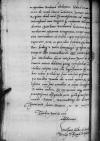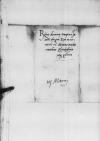 BCz, 1597, p. 523
BCz, 1597, p. 523
Reverendissime Domine, domine modis omnibus colendissime atque gratiosissime.
Obsequiorum meorum, tum mei ipsius sedula commendatione praemissa.
Accepi ⌊⌋ Reverendissimae Dominationis Vestrae, quibus scribere dignetur se pecuniam contributionum cervisiarium collectam in promptu habere atque eam Mariemburgum iuxta mandatum sacrae maiestatis regiae, domini mei clementissimi, et pristinam consuetudinem mittere velle. Saltem illi scriptis meis declararem, quo me nunc loco contineam. Certiorem itaque reddo Reverendissimam Dominationem Vestram me Sabbato ante Dominicam Invocavit ⌊Mariemburgum⌋ contulisse. Quare Reverendissima Dominatio Vestra thesaurarium suum cum eisdem pecuniis atque recognitione huc recta mittere dignetur. Etiam si aliquis casus, qui saepe plus valet quam ratio interveniret, ut mihi abeundum foret, tamen sunt hic mei scribae, quibus id negotii delegatum est, hi easdem pecunias recepturi sunt atque Reverendissimam Dominationem Vestram nomine meo de summa accepta quittaturi.
Rerum novarum nihil omnino nunc habeo praeter ea, quae iam sunt vulgatissima. Serenissimi ⌊regis⌋ nostri ⌊filiolam⌋ serenissimo ⌊Ungariae regi⌋ in matrimonium elocatam atque Sabbato ante Purificationis Gloriosissimae Virginis ferias e ⌊Cracovia⌋ profectam, quam serenissimus ⌊rex iunior⌋ una cum clementissima ⌊parente⌋ usque  BCz, 1597, p. 524 in ⌊oppidum Bochnensem⌋ deduxere. Haud etiam Reverendissimam Dominationem Vestram latere arbitror sacram ⌊maiestatem regiam⌋, dominum meum clementissimum, ad supplicem hidden by binding⌈[m]m hidden by binding⌉ intercessionem tam ⌊reginae⌋, quam oratorum Hungariae hidden by binding⌈[ae]ae hidden by binding⌉ domino ⌊castellano Biechoviensi⌋ leniorem et commodiorem sessionem assignasse, nempe conclave hidden by binding⌈[ve]ve hidden by binding⌉ sive caminatam, ut in litteris regiis expressum est, in superiori arce, in qua olim Pyenyązek detinetur hodieque e turri Kurzanoga egressus, reliqum hidden by binding⌈[um]um hidden by binding⌉ tempus illic transacturus.
BCz, 1597, p. 524 in ⌊oppidum Bochnensem⌋ deduxere. Haud etiam Reverendissimam Dominationem Vestram latere arbitror sacram ⌊maiestatem regiam⌋, dominum meum clementissimum, ad supplicem hidden by binding⌈[m]m hidden by binding⌉ intercessionem tam ⌊reginae⌋, quam oratorum Hungariae hidden by binding⌈[ae]ae hidden by binding⌉ domino ⌊castellano Biechoviensi⌋ leniorem et commodiorem sessionem assignasse, nempe conclave hidden by binding⌈[ve]ve hidden by binding⌉ sive caminatam, ut in litteris regiis expressum est, in superiori arce, in qua olim Pyenyązek detinetur hodieque e turri Kurzanoga egressus, reliqum hidden by binding⌈[um]um hidden by binding⌉ tempus illic transacturus.
Quae omnia quamvis for hidden by binding⌈[for]for hidden by binding⌉san iamdudum fuere notissima Reverendissimae Dominationi Vestrae, tamen meum debitum quoque exposcebat, ut in hidden by binding⌈[n]n hidden by binding⌉ itidem scriptis meis illi significarem. Cui in omni hidden by binding⌈[mni]mni hidden by binding⌉bus rebus perhibens sum morem gesturus. Cu hidden by binding⌈[u]u hidden by binding⌉pio tandem Reverendissimam Dominationem Vestram optime et felicissime cum suis omnibus in annos longissimos hidden by binding⌈[s]s hidden by binding⌉ ex animo valere. Cui me iterum atque iterum promptissimis obsequiolis meis quam diligentissime com hidden by binding⌈[om]om hidden by binding⌉mendo.
 BCz, 1597, p. 524 in
BCz, 1597, p. 524 in 

